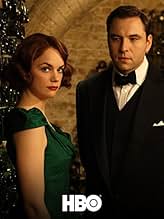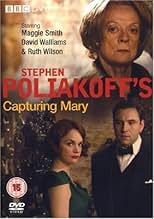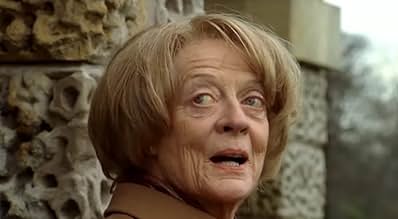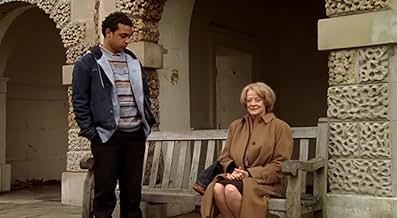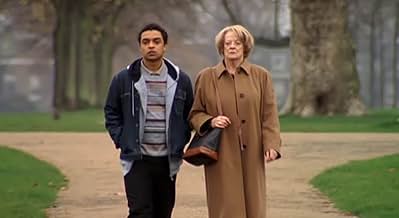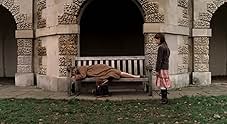IMDb-BEWERTUNG
6,7/10
2211
IHRE BEWERTUNG
Füge eine Handlung in deiner Sprache hinzuA young man ushers an older woman into a dark exploration of her past - back to the time when, as a young girl, she met a stranger who affected her life forever.A young man ushers an older woman into a dark exploration of her past - back to the time when, as a young girl, she met a stranger who affected her life forever.A young man ushers an older woman into a dark exploration of her past - back to the time when, as a young girl, she met a stranger who affected her life forever.
- Für 1 Primetime Emmy nominiert
- 1 Gewinn & 6 Nominierungen insgesamt
Freya Berry
- Beautiful Girl
- (Nicht genannt)
Jessica Blake
- Party guest
- (Nicht genannt)
Lily Brown Griffiths
- Party guest
- (Nicht genannt)
Kate Burdette
- Charlotte
- (Nicht genannt)
Lexie Lambert
- Parlour Maid
- (Nicht genannt)
Silvia Lombardo
- 1960s Party Guest
- (Nicht genannt)
Luke Lynch
- Man Leaving Pub
- (Nicht genannt)
Empfohlene Bewertungen
Hard not to argue with all the 1 and 2 star ratings. This is not a Hollywood-type movie. My take is a little different from those who believe the film is about power over others or miss spent youth. In trying to understand why this movie was made, and why many seem to think that there is not plot - I suggest the following.
Greville never existed. He symbolically, was Mary's past, which she never fully escaped from.
Greville was the representation of those times. He understood the horrors of the class system and power, but insisted that elitism is the better choice over the unwashed masses. That much is clear, that is, his attitude. Why did Greville need Mary's help? Because Greville was dying, that is, his power waning, his generation losing influence. That is, he is clearly depicted as representing his times in his unchanging attitude and even his 'symbolic' refusal to dress to the times. He knew many secret things, but no one really knew who or what he did, again symbolic, not really a man, but an incarnation of the theme - the passing of a generation.
But how could have Mary helped this 'symbol'? She was a writer, and could have written/influenced the course of social change. She lost her job, as it was stated, because her 'voice of youth' had already become passe. Mary, again as stated, was born between what was coming of age and what was dying socially. Somewhere along the way she lost her voice, her inspiration. Greville, wanted her to be his partner, he could help her professionally, meaning that by writing favorably of the past, of those mores, beliefs, and class system, those still in power (albeit waning) could support her.
Greville, the symbol, didn't directly have Mary fired. It was a plot device. Mary, as was stated, simply lost favor as the times moved on. Mary was torn between the past and her uncertain future. She dressed the part, again as stated, but she really didn't belong to the changes coming.
I believe, if you see Greville as a plot device, a symbol of Mary being lost between generations, then we see the sad story of a women who was lost. She was at her best when she was young, criticizing the mores of class and status. But then that grew tiresome, and meaningless, being on the leading edge, that type of criticism was soon to be common place.
The Greville, inside of her, wanted her to support what was refined in society, even if the gild often covered over ugliness just beneath the surface. Greville haunted her, when she wrote, she always ended up in the wine cellar, a symbol of the elite.
Why couldn't she surrender to Greville, that is, the voice in her representing, belonging to the past? That is a hard question to answer, and I would think could only be answered subjectively. I can venture to say that she recognized the ugliness of the past, but also could not accept how social change was pushing society towards also becoming ugly, common. Consequently, she was lost between two worlds. One the one hand a world her youth rejected, and the other which she becomes common herself, and wrote about antiques.
Greville never existed. He symbolically, was Mary's past, which she never fully escaped from.
Greville was the representation of those times. He understood the horrors of the class system and power, but insisted that elitism is the better choice over the unwashed masses. That much is clear, that is, his attitude. Why did Greville need Mary's help? Because Greville was dying, that is, his power waning, his generation losing influence. That is, he is clearly depicted as representing his times in his unchanging attitude and even his 'symbolic' refusal to dress to the times. He knew many secret things, but no one really knew who or what he did, again symbolic, not really a man, but an incarnation of the theme - the passing of a generation.
But how could have Mary helped this 'symbol'? She was a writer, and could have written/influenced the course of social change. She lost her job, as it was stated, because her 'voice of youth' had already become passe. Mary, again as stated, was born between what was coming of age and what was dying socially. Somewhere along the way she lost her voice, her inspiration. Greville, wanted her to be his partner, he could help her professionally, meaning that by writing favorably of the past, of those mores, beliefs, and class system, those still in power (albeit waning) could support her.
Greville, the symbol, didn't directly have Mary fired. It was a plot device. Mary, as was stated, simply lost favor as the times moved on. Mary was torn between the past and her uncertain future. She dressed the part, again as stated, but she really didn't belong to the changes coming.
I believe, if you see Greville as a plot device, a symbol of Mary being lost between generations, then we see the sad story of a women who was lost. She was at her best when she was young, criticizing the mores of class and status. But then that grew tiresome, and meaningless, being on the leading edge, that type of criticism was soon to be common place.
The Greville, inside of her, wanted her to support what was refined in society, even if the gild often covered over ugliness just beneath the surface. Greville haunted her, when she wrote, she always ended up in the wine cellar, a symbol of the elite.
Why couldn't she surrender to Greville, that is, the voice in her representing, belonging to the past? That is a hard question to answer, and I would think could only be answered subjectively. I can venture to say that she recognized the ugliness of the past, but also could not accept how social change was pushing society towards also becoming ugly, common. Consequently, she was lost between two worlds. One the one hand a world her youth rejected, and the other which she becomes common herself, and wrote about antiques.
I'm surprised to find myself headlining a Poliakoff film as "boring" but I can't find any other way of describing this drag of a sagging saga.
Maggie Smith can do no wrong of course, and it would be sacrilege to criticise - she is truly a very skilled actor and is the reason I gave the film 5 stars . . .
However, David Walliams felt like he was all his Little Britain characters in one. In LB he's in his element, but outside that zone of easy comfort, he is, well, merely Walliams being given something other than comedy to try out, and I'm afraid he didn't cut it for me.
Everything seemed to go only so far. The posh accent, the gesticulations, thr facial expressions - all conspired to leave me unconvinced. And it always felt like Matt Lucas was about to suddenly appear from the scullery.
There are others here better qualified than I who can tell you what they think the "plot" was all about. To my mind it was just a slow windy spiral staircase through the mind of a now older woman trying to exorcise some past demons.
I can't review anymore because I fell asleep. I'm sure those kept awake by wondering how it all ends will stay the course, but frankly, there wasn't much in this film to make me care about the ending.
Maggie Smith can do no wrong of course, and it would be sacrilege to criticise - she is truly a very skilled actor and is the reason I gave the film 5 stars . . .
However, David Walliams felt like he was all his Little Britain characters in one. In LB he's in his element, but outside that zone of easy comfort, he is, well, merely Walliams being given something other than comedy to try out, and I'm afraid he didn't cut it for me.
Everything seemed to go only so far. The posh accent, the gesticulations, thr facial expressions - all conspired to leave me unconvinced. And it always felt like Matt Lucas was about to suddenly appear from the scullery.
There are others here better qualified than I who can tell you what they think the "plot" was all about. To my mind it was just a slow windy spiral staircase through the mind of a now older woman trying to exorcise some past demons.
I can't review anymore because I fell asleep. I'm sure those kept awake by wondering how it all ends will stay the course, but frankly, there wasn't much in this film to make me care about the ending.
A superb follow up to Joe's Palace, Danny Lee Wynter had done a great job bringing Joe to life and giving the house a strong character. Those characters once again combine and tell a totally different story, so different in tone to Joe's Palace.
Visually sublime, it's a drama that makes you think outside the box, it doesn't conform to any of the usual rules, it isn't confined by today's classifications. It's just Stephen Poliakoff doing what he does best, making you lose yourself in a story.
It manages to be both creepy and engaging. I've always been a fan of David Walliams, but in this serious, slightly odd role, he gave what I see as his finest performance, he's charismatic, somewhat unnerving, quietly chilling. When Maggie Smith is on screen you can't help but watch in awe, she is outstanding, as is Ruth Wilson as her younger self.
Mr Poliakoff you've done it again. This was exceptional, 9/10.
Visually sublime, it's a drama that makes you think outside the box, it doesn't conform to any of the usual rules, it isn't confined by today's classifications. It's just Stephen Poliakoff doing what he does best, making you lose yourself in a story.
It manages to be both creepy and engaging. I've always been a fan of David Walliams, but in this serious, slightly odd role, he gave what I see as his finest performance, he's charismatic, somewhat unnerving, quietly chilling. When Maggie Smith is on screen you can't help but watch in awe, she is outstanding, as is Ruth Wilson as her younger self.
Mr Poliakoff you've done it again. This was exceptional, 9/10.
It is what it is. If you watched Joe's Palace, you'll get it. For those who called it rubbish, you're absolutely wrong. WWII was a beastly time in history, deep in conjecture. This is a good objective look on the frivolity and incomprehensible behavior and in-observance of that time in history. No different from now, same atrocities, same indifference and justifications of those in power. Inflictions of most civilians were not intended or personal, people were just trying to get through it, confused and thriving on distractions. So watch it, it's a history lesson. 10 for performances. You need to view Joe's Palace first. Great films for WWII history buffs, and promises an entertaining and pensive evening for both genders. It's a different take on the brutality of that time. Not drenched in warfare and genocide, but still moving and painful.
I watched this for the sake of two actors I admire and they didn't disappoint. The story is confusing, but Maggie & David have terrific screen presence. They only have one short scene together, but it's worth the wait. I'm a fan of David's comedic work and am aware that many may dismiss his talent because of this. In reality he is a dedicated actor, who enjoys learning new material and taking advice from directors/producers/co stars etc. The Making Of on the DVD shows this, as well as explaining some of the complexities of the plot. I look forward to the commentary too. I hadn't watched "Joe's Palace", but this wasn't essential. Maggie is simply magic. I read Greville as being a "vampiric" character - charming & sinister. No wonder she could never get him out of her mind. 8/10
Wusstest du schon
- WissenswertesCompanion piece to Joe's Palace (2007), which is the first movie.
- VerbindungenFeatured in The 62nd Primetime Emmy Awards (2010)
Top-Auswahl
Melde dich zum Bewerten an und greife auf die Watchlist für personalisierte Empfehlungen zu.
Details
- Erscheinungsdatum
- Herkunftsländer
- Sprache
- Auch bekannt als
- Поимка Мэри
- Drehorte
- 38 Hill Street, Mayfair, London, England, Vereinigtes Königreich(Mayfair mansion exteriors)
- Produktionsfirmen
- Weitere beteiligte Unternehmen bei IMDbPro anzeigen
Zu dieser Seite beitragen
Bearbeitung vorschlagen oder fehlenden Inhalt hinzufügen


